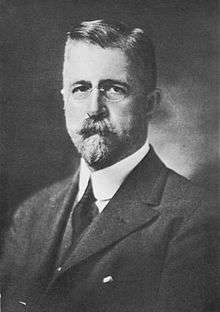Homer Hulbert
| Homer B. Hulbert | |
|---|---|
 | |
| Born |
January 26, 1863 New Haven, VT, USA |
| Died |
August 5, 1949 (aged 86) Seoul, South Korea |
| Nationality | American |
Homer Bezaleel Hulbert (January 26, 1863 – August 5, 1949) was an American missionary, journalist and political activist who advocated for the independence of Korea.
Biography
Hulbert was born in New Haven, Vermont, in 1863 to Calvin and Mary Hulbert. His mother, Mary Elizabeth Woodward Hulbert, was a granddaughter of Mary Wheelock, daughter of Eleazar Wheelock, the founder of Dartmouth College. After graduating from Dartmouth, Hulbert attended Union Theological Seminary in 1884. He originally visited the Korean Empire in 1886 with two other instructors, Delzell A. Bunker and George W. Gilmore, to teach English at the Royal English School.[1] In 1901 he founded the magazine The Korea Review. Before 1905 his attitude towards Japanese involvement in Korea was positive, as he saw the Japanese as agents of reform, in contrast to Russia, which he saw as reactionary. He changed his position in September 1905, when he criticized Japanese plans to turn the Korean Empire into a protectorate. He resigned his position as a teacher in a public middle school, and in October 1905 he went to the United States as an emissary of Emperor Gojong, to protest Japan's actions. After returning to the Korean Empire in 1906, he was sent as part of a secret delegation from Emperor Gojong to the Second International Peace Conference held in The Hague in June 1907. The Korean delegation failed to gain a hearing with other world powers, and the Japanese used the Emperor's actions as a pretext to force him to abdicate. Hulbert's 1906 book, The Passing of Korea, criticized Japanese rule. He was not so much theoretically opposed to colonialism as he was concerned that modernization under the secular Japanese was inferior to a Christian-inspired modernization.[2] He was expelled by the Japanese resident-general for Korea on May 8, 1907.
Achievement
Hulbert contributed to the advancement of Hangul with his research and study into the orthography and grammar of Hangul with Ju Si-gyeong.[3] and he made the first han-geul (Korean) textbook '사민필지(Sa min pil ji)'.[4]
Legacy
He was reported to have been a close personal friend Gojong of Korea.
Syngman Rhee, one of his middle school students, became the first President of Korea. Rhee invited Hulbert back to Korea in 1948. It was on this trip that Hulbert developed pneumonia and died. Hulbert's tombstone reads "I would rather be buried in Korea than in Westminster Abbey." He is interred at Yanghwajin Foreigners' Cemetery in Seoul.[5] He was the recipient of the Order of Merit for National Foundation by the Korean Government. He is referred to in the Republic of Korea as a 독립유공자 (contributor to independence)
Anthropology
Homer Hulbert said that Korea and Japan have the same two racial types, but Japan is mostly Malay and Korea is mostly Manchu-Korean. Hulbert said that Korea is physically mostly of the northern type, but also said that the nation, being physically mostly of the northern type, did not disprove Hulbert's claim that the Malay element developed Korea's first civilization, although not necessarily originating Korea's first civilization, and the Malay element imposed its language in its main features in the entire peninsula.[6] Hulbert said that in Korea there was admixture with Chinese blood that stopped more than a thousand years ago.[7]
Selected bibliography
- 1892 The Korean Repository (He was the editor of this monthly magazine)
- 1889 Knowledge Necessary for All
- 1903 Sign of the Jumna
- 1903 Search for a Siberian Klondike
- 1905 The History of Korea
- 1905 Comparative Grammar of Korean and Dravidian
- 1906 The Passing of Korea
- 1907 The Japanese in Korea: Extracts from the Korea Review
- 1925 Omjee - The Wizard
- 1926 The Face in the Mist
See also
- Royal English School (육영공원 Korean Wikipedia)
References
Homer Hulbert Biography. Royal Asiatic Society-Korea Branch
- ↑ Dynamic Korea: The American who loved Korea more than a Korean
- ↑ Andre Schmid, "Two Americans in Seoul, Evaluating an Oriental Empire, 1905-1910"
- ↑ "한글을 사랑한 첫 외국인, 헐버트/The first foreigner who loved han-geul". Retrieved 2015-10-05.
- ↑ Kim, jiyoon. "호머 헐버트, 한글 사랑한 벽안의 교사/Homer Hulbert the great blue eyes teacher". Retrieved 2010-10-05.
- ↑ JoongAng Daily: The journalist and missionary who defied Japan
- ↑ Hulbert, Homer B. (1902). The Korea Review. Seoul: Methodist Publishing House. Page 445 & 457. Retrieved June 4, 2017, from link.
- ↑ Kim, Ji-myung. (2014). Champion of the Rose of Sharon. The Korea Times. Retrieved May 31, 2017, from link.
External links
| Wikisource has original works written by or about: Homer Hulbert |
- The Hulbert Memorial Society
- "Homer Bezaleel Hulbert". Missionary, Journalist, Political Activist for Korean Independence. Find a Grave. Aug 19, 2011.
- Works by Homer Hulbert at Project Gutenberg
- Works by or about Homer Hulbert at Internet Archive